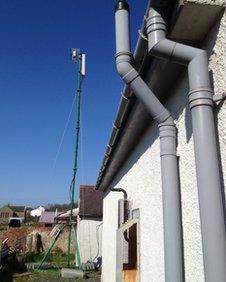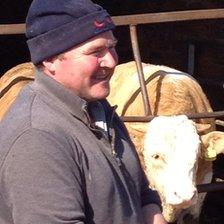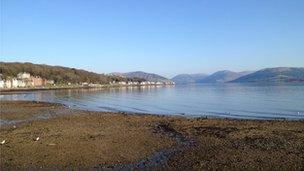Can White Space fill in the broadband gaps?
- Published
- comments
Can white space fill in the broadband gaps?
He's a quiet, even shy, farmer working hard tending his beef cattle herd on the Isle of Bute and mending outbuildings battered in the January storms. He admits he knows little or nothing about the internet, but Robert McAlister is part of an experiment which could help the UK achieve the government's slightly unlikely goal of leading Europe in broadband provision.
Because Bute is the site of a pilot of a technology called White Space, which seems as though it might be ideally suited to filling in some of the gaps in our broadband coverage. BT, which is running the trial, is certainly hoping that it will be part of the answer to reaching the 10% of the population which won't be served by the market, or by the various government schemes to bring fast fibre to remote areas.
White Space is part of the dividend from the digital switchover, spare spectrum no longer needed for television broadcasts. It is in the UHF band, familiar to anyone who tuned an old television years ago, and the amount of "space" varies around the UK.

The White Space transmitter
Fortunately, there is more of it in the areas where broadband coverage is already patchy and households are unlikely to see a fibre connection arriving anytime soon. Places like the Isle of Bute and other more remote spots in the Highlands and Islands.
The pilot programme on Bute involves a transmitter at a tiny exchange near the community of Kilchattan Bay, from which a broadband signal is transmitted to 10 homes participating in the trial. It sounds like wi-fi but the signal is actually just an extension of the fixed line network, with homes needing their own aerials to pick it up.
The McAlister family farm is one place testing out White Space. It's too far from the exchange for the copper network to deliver broadband, and the satellite broadband link the family used to depend on proved both expensive and unreliable.
So how is the new broadband link? "You'll have to ask my wife and kids about that," Robert McAlister told me when I asked what benefit the family were getting from the trial. But, as we looked at some of his prize bulls which can fetch a good price at auction, he explained that he had found one profitable use for the web.

Bute farmer Robert McAlister and one of his prize bulls
His daughter had shown him how he could monitor cattle auctions on the mainland via their websites, and watch live to see where the best prices could be found.
Chris Gibbs of BT's Openreach division, which hopes eventually to offer White Space as a wholesale broadband product, explained that it was a technology which would augment, rather than replace the standard copper network: "Although it has the same characteristics as copper - the further you go the worse the signal gets - it goes a bit further, and that's the advantage."
And, like a television signal, it can go direct to homes, whereas a copper or fibre cable has to wind its way along country lanes.
On a glorious March day - apparently it never rains on Bute - we toured the island to test the speeds delivered over the trial network. On a viewing platform overlooking a bay where seals could be seen playing in the shallows, we tested it out with a Skype video call.
After a few hitches, it seemed to work pretty well, with sound and video coming across then network. The speeds on offer, however, are far from spectacular. BT says it can deliver around 10Mbps or more, but at the moment it's giving users download speeds of between 4 and 8Mbps.
My own tests showed the network delivering only around 3Mbps - but then the upload speeds were about the same, making video conferencing eminently feasible. During the trial, the available capacity is being tweaked between upload and download to see what works best for consumers.
Compared with what they had before, the White Space broadband certainly seems an improvement to the trialists. At the Kingarth Hotel, a fine pub at Kilchattan Bay, they explained that their old broadband connection made it virtually impossible to order new stocks of beer online, with "timed out" messages a constant irritation. Now they have much speedier access to the brewery website.

The Isle of Bute is the site for the pilot technology
BT says this trial, and another taking place in Cambridge, are yielding promising results, but it warns that it is early days and it still isn't clear whether the technology will prove commercially viable. And White Space will have competition in the drive to bring faster broadband to Britain's notspots.
As I caught the ferry back from Bute to the mainland I took a call from a company eager to tell me about a rival technology. A firm called Tooway Direct, which provides satellite broadband connectivity, promised that it could offer customers in Bute and elsewhere across the Highlands and Islands, a fast and affordable broadband connection.
I pointed out that the farmer I had visited in Bute had found his satellite link neither fast nor cheap. Tooway Direct's managing director Andrew Walwyn admitted that the technology was still suffering from an image problem, but insisted that the launch last year of a new satellite dedicated to broadband provision had transformed the situation.
For many communities, he told me, the chances of getting a fast broadband connection in the next five years from BT were remote, but satellite promised "really fast broadband now with a comparatively small investments."
So, White Space could be one answer to patching the gaps in broadband coverage, satellite or 3G and 4G mobile networks could be another. The good news is that places that seemed doomed to the broadband slow lane are now in the sights of companies promising to make life online better.